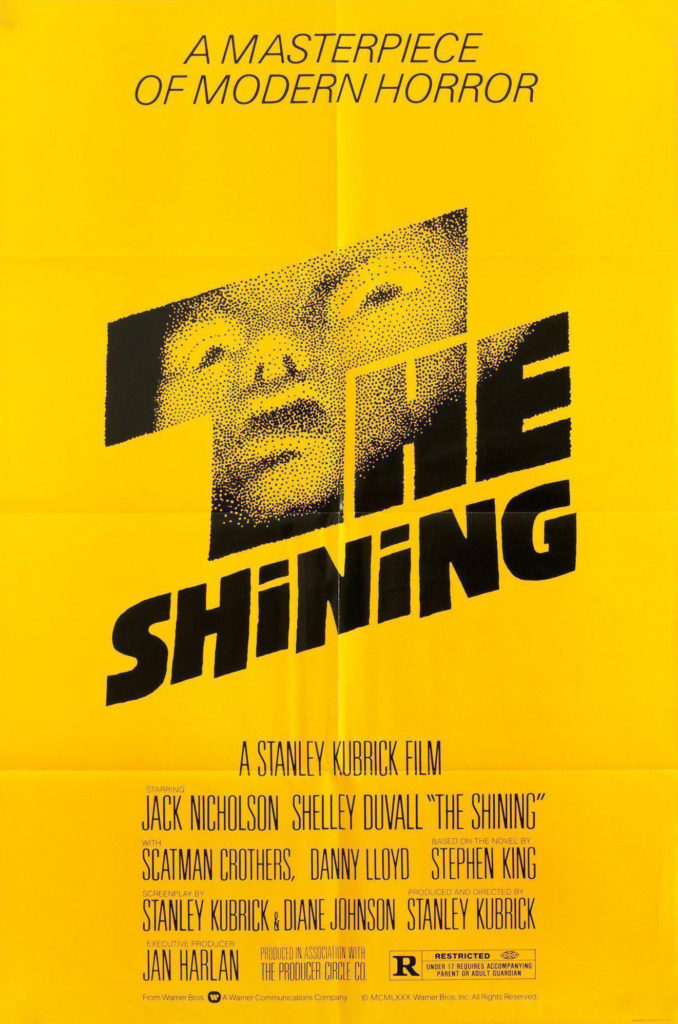Every single scene in The Shining, the classic horror film from Stanley Kubrick, is unsettling, sometimes deeply. From the opening montage, a series of beautiful helicopter shots of the Rockies, rendered menacing by the music of Wendy Carlos and Rachel Elkind, to the final slow zoom before the end credits, there’s not a single moment’s respite from the tension of this film. That makes The Shining somewhat unique in comparison to other horror films. There is no lighter side of the Torrance family’s lives that is upended by the goings on at the Overlook Hotel. They were doomed regardless.
All of Jack’s (Jack Nicholson) smiles are a sneering response to attacks on his patience. All of Wendy’s (Shelley Duvall) are cries for help. And as for little Danny (Danny Lloyd), well, I can’t recall him smiling once during the entire film. Things do not appear to be going that smoothly in the Torrance household.
The troubles of the Torrances, and their financial desperation, lead Jack to accept a job as a winter caretaker at the Overlook. He and his family will spend six months at the hotel in isolation, the guests and other employees all gone for the long Rocky Mountain winter. There’s a subset of people that can handle that type of isolation. NASA hires them to fly in spaceships. Wendy and Danny seem well-suited to life in the vast, winding halls of the Overlook. For Danny, it’s no better or worse than any other day, while Wendy seems to view it as a grand adventure, and maybe an opportunity reconnect with her husband. Jack, however, seems to have talked himself into believing the job is the start of a reinventing of his life. The Overlook is a chrysalis that will take Jack, the teacher with a drinking problem, and transform him into Jack, the successful author.
The hotel is transformative, but not in the way Jack or Wendy hope. The hotel is a place of evil, and it’s clear early on in the film that the Torrances will be fortunate to survive their stay unscathed. The hotel cultivates a special relationship with Jack.  Whether the visions he sees and the people he meets are supernatural entities or the creation of his mind is not a totally ambiguous question. But Jack’s fragility does seem to work in concert with the strangeness of the hotel. As the film continues, Jack grows more and more disturbed, finally putting his family in grave danger.
Whether the visions he sees and the people he meets are supernatural entities or the creation of his mind is not a totally ambiguous question. But Jack’s fragility does seem to work in concert with the strangeness of the hotel. As the film continues, Jack grows more and more disturbed, finally putting his family in grave danger.
The story in The Shining can be a bit disjointed at times. It’s also heavy on symbolism, to the point where some of the visuals towards the end are laughably silly. But the developed sense of menace that pervades the film makes up for much of Kubrick’s sins of over-filmmaking. Just like an actor can be guilty of hamming it up, so too can a director. But these sequences are short — mere blips in a film that otherwise is a masterpiece of visual storytelling.
Kubrick also chose the perfect lead for The Shining. Jack Nicholson is one of those Hollywood stars who is a fine actor, but on most occasions does not disappear into a role. That is, for most performances, viewers are very much aware that they are watching Jack Nicholson and not a character he is playing. But Nicholson’s case of Al Pacino Syndrome is far from fatal for this film. His Jack Torrance is wound tight. Torrance might not be aware of it, but he scared the bejesus out of his family before the Overlook ever started working on him.
Nicholson does a fantastic job portraying someone who rules over his family like a tyrant. Jack Torrance takes his role as breadwinner seriously, but he also uses it as an excuse to become embittered with his wife and son. It’s even worse in Wendy’s case, as he has little respect for her. Just like setting and scene are menacing, Nicholson’s Jack Torrance is a blight on any sense of comfort in the film. He is just as much a victim of the Overlook as Wendy and Danny, but it is only he that is a danger to others.
The Shining is what happens when a filmmaking titan dips their toes into horror. It’s a genre, like sci-fi, that is usually reserved for filmmakers who are in the early stages of their careers. But like Howard Hawks, Danny Boyle, and many others, Kubrick showed that the public’s general disregard of horror as a place for quality films is not because of the genre itself, but because great filmmakers don’t spend enough time making horror.
